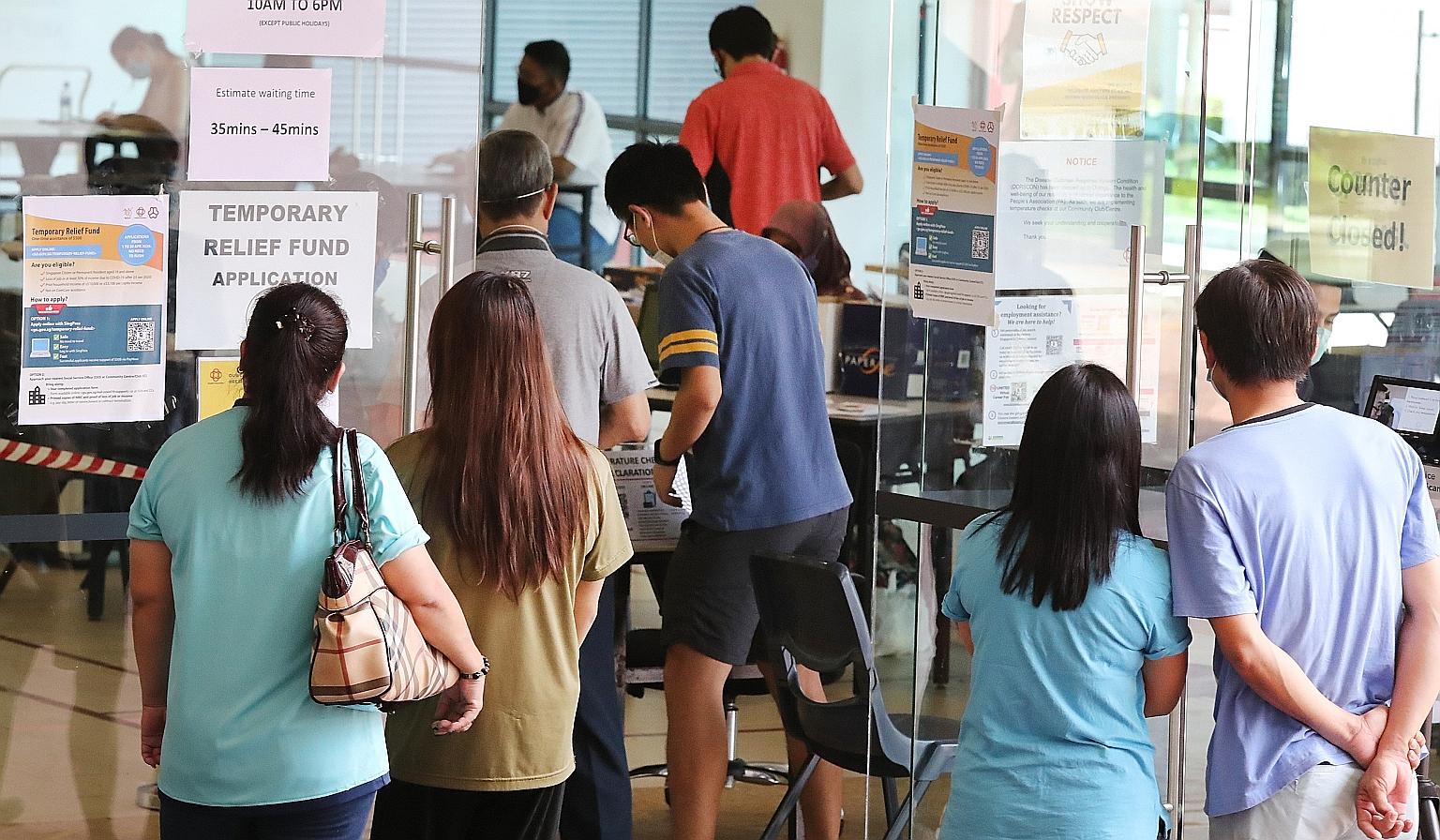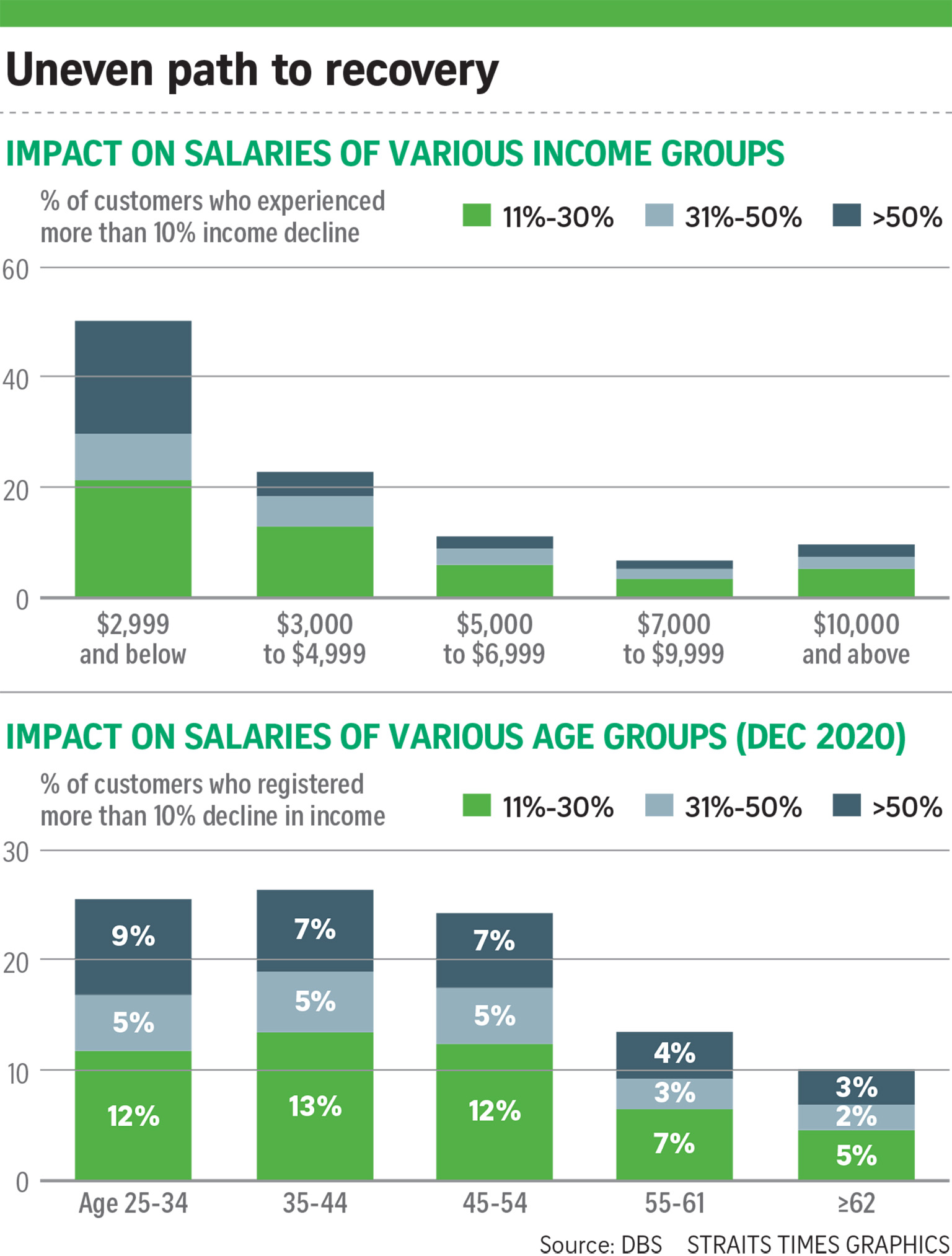Low-income group struggling amid Covid-19 recovery: DBS
Middle-aged workers still affected too, even as financial health for most improves: Report
Sign up now: Get ST's newsletters delivered to your inbox

People applying for the Temporary Relief Fund last April. The latest NAV Financial Health Series report released yesterday found that the lower-income group was the worst hit - accounting for about 49 per cent of customers who experienced income loss due to the pandemic - and that more sustained support may be needed for the vulnerable.
LIANHE ZAOBAO FILE PHOTO
The nascent economic recovery that started in the latter half of last year has improved the financial health of most Singapore residents, but some segments of the population are still struggling, a DBS Bank report found.
The path to recovery from the coronavirus-induced recession is likely to be uneven and may require more sustained and targeted support for the vulnerable lower-income group and middle-aged workers, it said in the second edition of its NAV Financial Health Series report released yesterday.
DBS aggregated anonymised data from 1.2 million retail customers and compared it with the pre-Covid-19 period, defined as the average of the two lower months between December 2019 and February last year.
The latest report found that the lower-income group was the worst hit - accounting for about 49 per cent of customers who experienced income loss due to the pandemic.
In December last year, the share of customers who experienced a significant fall in income fell to 19 per cent - down from 26 per cent in May last year. This reflects an improvement in the financial wellness of Singapore residents amid the economic recovery, DBS noted.
The percentage of lower-income earners who experienced severe income loss also improved, with the figure falling to 42 per cent last December from 51 per cent last May.
Within the workforce, middle-aged workers also still accounted for the majority of those who experienced income deterioration.
Almost half of those in this age group saw their incomes decline by more than 30 per cent - although compared with the other age groups, they made the most significant progress during the economic recovery.
Middle-aged workers also saw a persistent increase in unemployment rate.
In terms of sectors, the financial health of workers in the food and beverage, hospitality and aviation industries improved, supported by the restoration of earlier wage cuts and payment of year-end bonuses.
A slew of policy measures specifically aimed at boosting businesses in the hardest-hit sectors also helped to support the workers.
But these workers will continue to face higher impact to their income compared with the other sectors, and may continue to require additional policy support, such as the extension of the Jobs Support Scheme announced during the recent Budget.
The report also found that the pandemic prompted customers to save more.
Emergency savings of all income groups rose amid the crisis and reached peak levels in June last year, before tapering off as economic conditions improved.
For example, the emergency funds of customers who earn more than $10,000 peaked at an amount equivalent to four months' worth of salary.
However, the savings situation of those who suffered income decline appears to have worsened. As at December last year, almost half of customers who experienced a significant fall in income had less than a month of emergency funds.
The lack of sufficient savings also appears to be more pronounced in the lower-income group, as they are most likely to have dipped into their savings to weather the crisis.
DBS said that continued and increased support for the vulnerable segments, such as those who have inadequate savings and consistently poor cash flow, remains crucial as the worst may not be over for them.
There are also signs that the lower-income group will continue to dip into their savings to meet their monthly financial obligations. This makes policy efforts to support this group crucial, especially in terms of employment prospects, DBS said.
DBS senior economist Irvin Seah said that while some segments of society have made concerted efforts in financial planning, there are many who have not been able to do so.
"For the less prepared, though policy support will be helpful in closing the gaps in times of crisis, it should never be a cure-all or a permanent solution," he said.
"The experience gained in this crisis pertaining to financial planning is important, particularly for those who have suffered from income deterioration. To better prepare for a sustainable financial future, rigorous and prudent financial planning should be a way of life for everyone, going forward."



